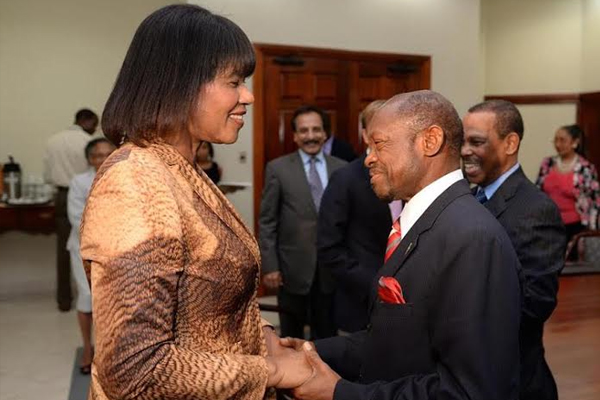
PM Douglas lists significant lessons learnt at PANCAP Workshop in Jamaica

Basseterre, St. Kitts — St. Kitts and Nevis’ Prime Minister the Rt. Hon. Dr. Denzil L. Douglas says despite been disappointed on making significant progress in the area of Stigma and Discrimination in the fight against HIV/AIDS/PANCAP has held several consultations, issued reports, made countless recommendations and generated greater emphasis and awareness and even witnessed a greater display of tolerance on which to draw.
This is what he told a three-day consultative workshop in Jamaica, part of the PAN-Caribbean Partnership against HIV/AIDS’ (PANCAP) Justice for All and Human Rights campaign being held under the theme: “Advancing justice for all and human rights in the Caribbean.”
He said the national consultations have focused on an agreed concept and outcome has no doubt paved the way for positive results.
He said that in preparation for the engagement leading up to a Justice for All roadmap at the end of this consultation, there are significant lessons on which one can draw.
“First, it is after all due to the AIDS activists rooted in the civil society organizations that advocated for a more equitable response to treatment as a human right that has benefited the over 15 M people throughout the world, with access to affordable medicines. In the Caribbean today, approximately 50 percent of people living with HIV have access to ARVs compared with 10 percent a decade ago. Second, in our case it is important to recognize the role of that noble band on Ministers of Health which included our present CARICOM Assistant Secretary General Slater who with the support of UNAIDS and PAHO, under the banner of PANCAP successfully negotiated with pharmaceuticals in 2002 to obtain massive reductions in the cost of drugs. This started a worldwide trend. Yet our work in treatment must be accelerated if we are truly to get to an AIDS generation,” said Prime Minister Douglas.
He said the third was due to the unique mechanisms of the Global Fund established in 2001, subsequently with support from PEPFAR and other development partners that contributed in no small measure to the accelerated programmes leading to spectacular reductions in prevalence rates and to deaths from AIDS.
“Fourth, due to the accelerated treatment and prevention regimes, we in the Caribbean could aspire to be the first region in the World to eliminate mother-to-child transmission of HIV by 2015. Fifth, there is clear evidence that broadening strategic partnerships designed to increase access to education, health and social protection services are social drivers that contribute toward ending AIDS as well as extreme poverty. Indeed this is the type of new approach for development cooperation that will inspire regional positions on AIDS and health in the post 2015 era. This suggests the need to focus on the elimination of inequalities and social justice that are essentially the concerns of this consultation, over the next two days,” Prime Minister Douglas said.
He said the sixth lesson is the emphasis that must be placed on research – combining medical and behavioural approaches — to assist policy makers to make the case for investing in reducing HIV related stigma and discrimination.
“Of relevance to this meeting is the reference made by the UNAIDS Deputy Executive Director to the World Bank studies showing the relatively high costs of homophobia. And so to support activism, coordinated negotiations, sustainable financing mechanisms, accelerated treatment and prevention regimes, and attention to social drivers and research are general issues from past experiences that must be now taken into consideration in designing our Roadmap in going forward,” Prime Minister Douglas said.
It was coordinated by the PANCAP Coordinating Unit in collaboration with the Joint United Nations Programme on HIV and AIDS (UNAIDS) the Jamaica government and the University of the West Indies, with funding support from the Global Fund for Tuberculosis, AIDS and Malaria (GFATM).
